Stories from
Heavy rain anticipated during trick-or-treat hours
The National Weather Service is forecasting heavy rain, about a half-inch, between 4:30 and 7 p.m. for Genesee County.
Those are prime trick-or-treat hours but at least two venues in Batavia are moving their Halloween-related events indoors.
There is an event, a fall festival, starting at 5 p.m. at City Church's St. Anthony's facility on Liberty Street and what was originally a "trunk-or-treat" event at Grace Baptist on Vine Street at 5:30 p.m.
As for the rain, expect flooding in low-lying areas. Motorists are urged to slow down during the storm. Brief gusty winds are expected around 7 p.m. before strong winds arrive before the morning.
Ortt attacks House vote to hold impeachment inquiry
Press release from the NY-27 campaign of Sen. Rob Ortt:
“Today’s house resolution vote was nothing more than a partisan attack on a sitting president going into the 2020 election.
The only platform of Democrats is, and for the last three years has been, impeaching President Trump.
This vote only serves as a distraction from the fact that Democrats have not done anything for middle-class Americans.
These types of actions do nothing but further separate an already divided nation and create animosity amongst everyday Americans.
I am running for Congress to help put an end to this partisan witch hunt, and help our President do the job the American people elected him to do.”
Woman in Batavia accused of selling drugs to Task Force agents
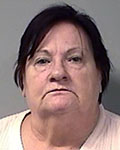
A 64-year-old woman living in Batavia has been arrested on suspicion of selling controlled substances following an investigation by the Local Drug Task Force.
Linda P. Thomas, of West Main Street, is charged with criminal sale of a controlled substance, 3rd, criminal possession of a controlled substance, 3rd, criminal sale of a controlled substance, 5th, and criminal sale of a controlled substance, 5th.
Thomas is accused of selling hydrocodone to an agent of the Local Drug Task Force and alprazolam to an agent on two other occasions.
Thomas was arraigned in County Court and released under supervision of Genesee Justice.
Wind warning issued for tonight
Strong winds are expected to start tonight at 8 p.m. and a high wind warning and hazardous weather outlook statement has been issued by the National Weather Service for Genesee County and most of Western New York.
Winds of 40 mph with gusts of 60 to 65 mph are forecast.
The warning is effect until 1 p.m. tomorrow.
Damaging winds could bring down trees and power lines. Widespread power outages are expected. Travel will be difficult, especially for high-profile vehicles.
The weather service urges people to avoid being outside and around trees and branches. The statement urges residents to remain in the lower levels of homes and to avoid windows.
O'Lacy's introducing new porter brewed for pub by Eli Fish

O’Lacy’s Irish Pub & Eli Fish Brewing Company have worked together and created a custom-made beer, hoping to show the public and business community that its not always about competing, but when you work together, both businesses can benefit!
On Tuesday, Nov. 5th , 5-9 p.m., O’Lacy’s Irish Pub will be hosting a kick-off party for the new hazelnut porter that has been custom made for O’Lacy’s Irish Pub by Eli Fish Brewing Company.
The collaboration was inspired as Kent Ewell (owner, O’Lacy’s), Chris Hoffman (bartender at O’Lacy’s) and Matt Gray (wwner, Eli Fish) were discussing the large amount of draft beer that O’Lacy’s sells.
“We should make you your own custom brew,” Gray said. “You pick the type (lager, ale etc.) and flavor if you wish and we can make it."
After reviewing what was currently on tap at O’Lacy’s, Ewell chose a hazelnut porter, which is named appropriately, “Old Sod Hazelnut Porter.”
After sampling the test batch, Ewell said, “I think this is very unique and something people will enjoy.”
At Tuesday's kick-off party, pints will be on special for $3.50. Come on out and try the new “Old Sod Hazelnut Porte,r” which pairs perfectly with O’Lacy’s Reuben sandwich and famous homemade chips and dip.
Pembroke girls advance in sectional volleyball tournament
The Pembroke Girls Volleyball Team won their first-round playoff game Wednesday, beating Letchworth 3 sets to 1.
The win sends the Lady Dragons to a quarterfinals match against Bloomfield at Bloomfield at 6 p.m., Saturday.
Pembroke took the first two sets against Letchworth 25-21 each, dropped the third set 25-17, and won the forth and match 25-19.
Dekari Moss had 14 kills and seven digs; Oliva Mets, 17 assists; and Allie Schwerthaffer and Trinity Humel each had seven digs.
Murder suspect refuses to leave jail for court, judge tells deputies to bring him by force next time
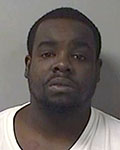
A former parolee from Rochester accused of murdering a good Samaritan on Ross Street at the end of May refused to appear in court today for an evidentiary hearing and Judge Charles Zambito set a new hearing date and ordered deputies to bring him in by force next time if necessary.
Quinten Edmonds is being held at the Genesee County Jail while awaiting trial. He is accused of killing Michael R. Paladino, 43, after Paladino reportedly saw Edmonds hitting a woman, who had been a passenger in the Rochester man's car, outside of Paladino's apartment on Ross Street.
A grand jury has indicted Edmunds on second-degree murder, a Class A-1 felony.
Batavia Police Chief Shawn Heubusch said after the incident that their investigation indicated that Edmonds was in a vehicle in the City when an argument began between Edmonds and at least one of the two women in the vehicle with him. The vehicle stopped on Ross Street and the argument continued outside the vehicle.
Emergency dispatchers received a call of the disturbance at 5/7 Ross St. at 12:44 a.m.
Paladino suffered multiple stab and cut wounds to his upper torso and head and collapsed in the entryway of his apartment. He was transported by Mercy EMS to UMMC. He was pronounced dead at 5:05 a.m. by Coroner Don Coleman.
The women in the vehicle fled the scene right away and a police officer saw a vehicle driving erratically and stopped it in the parking lot just east of St. Joseph School.
Edmonds is next expected in court at 3 p.m., Dec. 12.
Man faces up to 20 years in prison after admitting to hammer attack on Ellicott Street resident
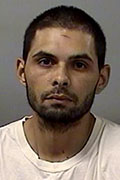
Benjamin Santiago Jr.
A man accused of entering an apartment on Ellicott Street and attacking the resident with a hammer before stealing property and a credit card and then stealing a truck from another person appeared in Genesee County Court today and accepted a plea bargain he had previously turned down.
With the guilty plea in the assault and robbery case, Benjamin Santiago Jr., 30, is facing a prison term of eight to 20 years.
Sentencing is scheduled for Dec. 5 at 2 p.m.
At 9:15 p.m., June 2, Santiago entered the apartment of a person he knew on Ellicott Street and demanded money. When he didn't get it, he attacked the man with a hammer, then stole items and fled on a bicycle he had stolen earlier in the day from a location on Bank Street.
He then located a 2010 Ford F150 Lariat super cab truck belonging to a third victim and fled to Rochester, where he was located and arrested by police there.
Santiago had rejected a similar plea offer before the case was referred to the grand jury.
He came into court facing an eight-count indictment, including first-degree robbery and a first-degree assault, and with the previous plea offer no longer on the table; however, after a conference with Judge Charles Zambito, Santiago was allowed to enter the plea under the same conditions as the previous offer.
Santiago has been arrested previously in and around Batavia, including a case involving problems at a local hotel that led to a multi-agency manhunt 2011. The two brothers in the case were later accused of trying to hire somebody to kill Santiago. Eventually, that case led to a prison term for Santiago. He was most recently accused of stealing $800 in tools from Crocker's Ace Hardware in Le Roy.
County keeps tax levy below cap despite new state mandates
The proposed county budget for 2020 includes a 7-cent property tax rate increase for county residents, up from $10.04 to $10.11, while the county grapples with new state spending mandates but manages to keep the tax levy under the state's 2-percent cap.
The proposed tax levy is $31,015,658, up $759,567.
Mandated expenses, from Medicaid to law enforcement functions, will consume 72 percent of the levy.
Total anticipated general fund expenditures are $114,048,256, or $13,030 less than 2019's.
New mandated expenses include additional services related to the Raise the Age legislation, which now requires most criminal cases involving 16- and 17-year-olds to be referred to a youth court, at $318,373. The state is expected to provide the county with full reimbursement for these expenses.
What is not reimbursed are expenses related to bail reform and new evidence discovery requirements, which require the District Attorney's Office to add additional staff, including a new full-time assistant district attorney, a part-time ADA, and a new paralegal.
The Public Defenders Office is also adding an attorney but this expense will be covered by state aid.
The county will have 452 full-time-equivalent employees.
While the state is pressuring municipalities to enter into more shared services agreements, the county has pretty much exhausted those opportunities, County Manager Jay Gsell suggested in his budget statement.
The county has been sharing services with County Highway and other county highway departments for 21 years. There are also shared service agreements for the Health Department with Orleans County and combined youth services between the county, city, and Orleans County.
The Chamber of Commerce Tourism Bureau has an anticipated budget of $420,000, entirely funded by the bed tax.
A motor pool agreement with Enterprise Fleet Management and energy savings initiatives as a result of consulting with Johnson Controls currently gives the county an anticipated $200,000 in savings.
A public hearing on the proposed budget will take place Nov. 6 in the Old Courthouse. The Legislature will vote on the proposed budget Nov. 25.
Video: St. Joe's student wins poster contest, rides to school in fire truck
Harper Ferris, a third-grader at St. Joseph School, got to ride to school in a City of Batavia fire truck because she was one of the winners in the City Fire Department's annual Fire Prevention Poster Coloring Contest.
Over the next week, two more poster contest winners will get to ride to school in a fire truck.
Photos: Trick or treat at the Richmond Memorial Library

Richmond Memorial Library hosted a trick-or-treat party Monday night with Batavia police officers offering parents safety tips and reading a story to the children, who then trick-or-treated through the library.
Top photo: Det. Matthew Wojtaszczyk and Officer Kevin DeFelice with little officer Aiden Scott, age 3.




Photo: Liberty man on Main Street
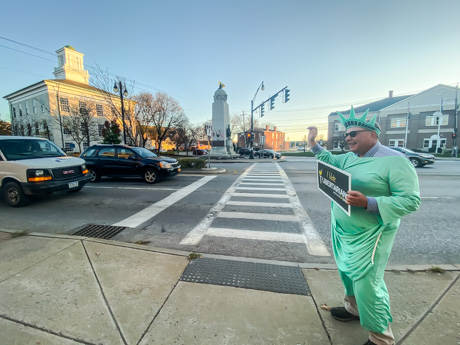
David Olsen, former chairman of the Genesee County Libertarian Party, lost a bet on the Yankees so he had to wear a Statue of Liberty Costume on Main Street in Batavia yesterday, which he did, waving a sign that said "Vote Libertarian."
Joining him was Deborah Kerr Rosenbeck, a City Council candidate.
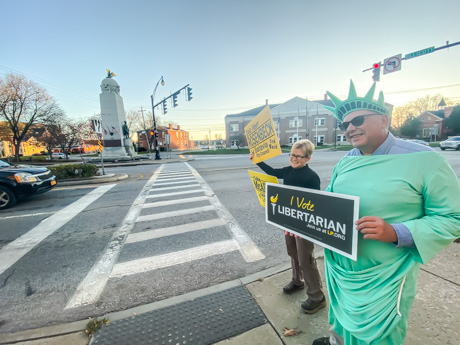
Q&A with City Court judge candidates: Ben Bonarigo
Residents of the City of Batavia will select a new full-time City Court judge in the Nov. 5 General Election. The candidates are Durin Rogers and Ben Bonarigio. We sent each candidate a series of questions about their views of the law. We are publishing their written answers verbatim. Here are the answers from Ben Bonarigo.
Among the current members of the U.S. Supreme Court, which justice do you admire the most and why?
Of the current members of the U.S. Supreme Court, I identify with and admire Justice Ruth Bader Ginsberg the most. Justice Ginsberg was raised in a working-class family in a rented apartment in Brooklyn, N.Y. She was a voracious reader and spent a good deal of her early years in the public library. She attended and graduated from public schools. Tragedy struck when her mother died from cancer a week before Ruth graduated from high school.
Earning a full scholarship to Cornell University, the seeds of legal activism and gender equality were planted. She believed very firmly in the idea, and correctly so, that women should be, in all respects, treated equally as men were under the law. This ideal was “firmed up” in her years at Harvard and Columbia Law where she graduated with her law degree at the top of her class. She left Harvard after the Dean asked her (along with her 8 other female classmates) why they were taking up the class seats of men at Harvard Law School. She transferred to Columbia Law School the next year.
After graduation, she became a law school professor and strenuously pursued significant gender-based discrimination cases. Many of those cases she successfully argued before the Supreme Court. After a stint on the U.S. Court of Appeals for the District of Columbia which commenced in 1980, she was appointed, and confirmed in 1993, to become the second female to ever sit as a Justice on the U.S. Supreme Court.
Justice Ginsberg has distinguished herself as a Justice who faced gender discrimination at almost every step of her education and legal career. She used that discrimination to fuel her desire to help women who, like her, were being improperly discriminated against in this country. Although I don’t always agree with where she comes down on her legal opinions, I have the utmost respect for this diminutive lady who has worked her way to the top bench through some very adverse circumstances. She tenaciously fought legal battles for all women to reach equality. She also fought hard for inequalities of other types in her illustrious career before becoming a judge.
She is living proof, and a beacon for all, to show how hard work, a thirst for knowledge, having a passion for what one believes and intense perseverance can propel them to the apex of their chosen field.
Do you view the Constitution as a living document or would you define yourself more as a strict constructionist, and if neither of these terms fit your view of the Constitution, how do you view it as a point of Constitutional philosophy?
As a City Court Judge, the issue of constitutional philosophy would rarely, if ever, come up, being more the domain of appellate justices or the Justices of the U.S. Supreme Court. To view the Constitution as a living document is to say that the words on the document evolve over time, and they must be interpreted in light of the changes and adaptations of the people that they govern in the current day. In other words, current-day meaning must be read into the words of the Constitution. When interpreted this way, the words are easily stretched to extend the Constitution to meanings that may never have been intended by the Framers. This occurs as a function of judicial interpretation as opposed to Constitutional amendment or the legislative adoption of a law allowing or prohibiting the conduct described.
The ability to interpret, so as to create law, is the reason that the appointment of federal judges has become such a political hot point in America today. If the justices view the document as a “living document”, it politicizes their appointment because they will sit a lifetime on the bench, potentially creating law for decades. This happens no matter what the political affiliation of appointing powers be at the time. I, for one, am tired of all the political wrangling between the nominating President, and confirming Congress, as it places too much emphasis on politics in what is supposed to be an independent, fair and impartial bench beholden to nothing.
On the other end of the spectrum is the view of the strict constructionist, which is sometimes referred to as the “originalist” perspective. An originalist views the Constitution as a law, giving the law the meaning that its words were understood to mean at the time of its adoption. I wouldn’t interpret the Constitution as a living document nor from an originalist position either. I see myself more in line with the late Antonin Scalia, Supreme Court Justice, who was a self-defined “textualist”. Justice Scalia felt that it was not important to look to the Framers' original intent when they set the Constitution up as our national mission statement but to look to the actual words of the document as being the law. Stated a different way, what the words comprising the Constitution meant when it was adopted are what they mean today, not what we think our founding fathers meant when they chose which words to use.
As time and society’s views on the law and policy change, there is an amendment process built into the Constitution that has been exercised many times throughout history since its original adoption. Therefore, the meaning of the document doesn’t change as a result of our changing society. If there needs to be an amendment, then take the steps to amend it. Admittedly, the steps for the amendment process are burdensome and time-consuming; however, not insurmountable as history dictates.
To view the Constitution in any other way than as a “textualist” renders it meaningless. Why have a Constitution at all if a judge or group of judges can change its meaning because of the way the wind is blowing politically or socially? If a “living document” view is taken, this is accomplished by simply stretching the words of the Constitution to fit the desired result, and if by a strict constructionist this is done to add meaning to the Framer’s intent to find the desired result. I might add here, that a “living document” philosophy is not Liberal, as opposed to Conservative, because given the opportunity to ply the Constitution to fit their needs no matter where they fit on the political spectrum if the opportunity arises it will be seized upon.
Justice Scalia referred to it as a modernist view (a living document) versus the traditional view (textualist) and I for one consider myself traditional. While in taking this view I understand that amending the Constitution is a long, laborious and, at times, a politically charged endeavor. Nevertheless, in construing the Constitution in this manner the hope would be that it would take the judiciary out of creating legislation where it may not ever have been intended. It would leave the act of creating law to the elected legislative branch instead of the appointed judges, and amendment of the Constitution to the citizenry of this great Country.
What three books related to the law have influenced your thinking the most about legal philosophy and why?
- To Kill a Mockingbird by Harper Lee. This novel was written in 1960 and is set in the American Deep South in the Jim Crow era of the 1930s. I read this Pulitzer Prize-winning novel in my first year of college. Atticus Finch is a white lawyer who is assigned to represent a black man, Tom Robinson, who is wrongfully accused of beating and raping a white woman. Sadly, justice doesn’t prevail as the all-white jury convicts Robinson irrespective of his innocence, which was commonplace in this time and place. Moving beyond the racial injustice, this book stands for much more. I was moved by the high moral standards and ethical behavior displayed by Attorney Finch in his representation of Robinson. Finch, after a slow start, but after realizing that Robinson was wrongfully accused, provides him with a stellar legal defense even though it made Finch unpopular in his own community. To me, this is what stands out most in this novel, and which has left an indelible mark on me. The idea that no matter how unpopular the criminal charge or the accused is, that he is entitled to the best defense the lawyer can put forth on behalf of that person. Indeed, during my 37-year career as a trial lawyer, I was asked countless times “how can you represent that person?” I would respond that as a matter of my legal ethics that if I undertake the representation of an accused individual, I must do so zealously and adequately despite how you or others might feel about the cause. Moreover, what if ever lawyer were scared away from representing individuals in difficult cases. What would happen to justice in our courtrooms? More probably, I thought to myself what would Atticus Finch do or say in this circumstance as he became a symbol, albeit fictional, of what equal protection and justice means in American Jurisprudence.
- The Concept of Law by H.L.A. Hart. I read this book as a 1st-year law student and I must admit that it almost scared me away from pursuing a career in law as it so philosophically written. Hart was both a lawyer and a philosopher, and I struggled to find any practical application from it at the time. I thought it important to come to an understanding of what the law was, as I had chosen to embark upon a career in it. I read this book after speaking to one of my Professors. It took me several reads before I came away with what Professor Hart was saying. In this dissertation, Hart defines the difference between rules of law and orders. Orders, refrain people from doing or direct them to do, certain acts with a sanction for non-compliance. Thus, acting as a guarantee that individuals who obey will not be sacrificed to those who do not. Rules empower people to act in certain ways such as to make a will or a contract. Failure to comply with the rules, such as the Statute of Frauds, is to nullify the contract, not sanction the individual. Therefore, rules are normative in nature, molding the way society acts in certain instances. He further distinguished between rules that were “primary” and those that are “secondary”. Primary rules are those that impose duties, such as the Penal Law. Secondary rules are those that give meaning, recognition, empowerment, and enforceability to the Primary rules, such as the Criminal Procedure Law. The uniting of Primary and Secondary rules is what Professor Hart calls the “center” of a legal system. Hart makes us keenly aware that a system of law designed only by fear of coercion will never succeed. It must, in addition, be sensitive to the recognition of authority granted to the system to implement and change the rules as time goes by. Most importantly, it must be based on a sense of moral responsibility because the imposition of laws by the authority (regime as Hart refers to it) that are morally reprehensible are doomed. To me, this illustrates, the sensitive balance that a system of law resides within. When legislatures begin to adopt laws that don’t sit well with the moral public or leave them on the books longer than needed, the fear is that there will be a lack of compliance, which if extended to its logical conclusion, could result in anarchy.
- My Own Words by Mary Hartnett and Wendy Williams. This being a relatively new read (2016), it has inspired me to recently think about how polarized our country has become politically. This is a biography of U.S. Supreme Court Justice, Ruth Bader Ginsberg. I have now walked two laps around the entire City of Batavia on the campaign trail. I have found the majority of people warm and receptive to my knock despite differing political labels and affiliations but, not necessarily political views. In a few instances, that fond reception was not the case, and I was surprised by the curt treatment received. During this walk, considering myself somewhat naïve politically, it became apparent to me very early on how polarized we have become as a people; even at this level. Again, most who reject my candidacy are polite indirectly stating so or did so by politely listening to what I had to say and thanking me for stopping by. It is not those that I take issue with, it is the door slammers and name-callers that trouble me. As a firm believer in our democratic form of government, I recognize that political discourse is the bedrock of our society. I have no problem with that, however, I do have a problem with the nature and tenor of the discourse I heard on my walk. In some instances, it’s fairly clear that political civility has gone out the window on a national level and the reasons why would take up space way beyond that allotted here. Suffice it to say there is blame to go around on all sides in my opinion. It never dawned on me for a moment that this unkind treatment of one person by another based upon political affiliation would filter down to this local level for a judicial race. After all, aren’t judges to be independent thinking and insulated from all outside influences including political view? When I embarked upon this campaign, I truly thought that politics would not play into such a low-level judicial position, believing that was a feature of the loftier state and federal benches, and that votes would be cast based solely upon the candidates’ education, legal experience and commitment to the community. Obviously, for some, (thankfully not all), this is not the way they see this type of election. This race, for some, is a microcosm of what is occurring on the national level and “lines have been drawn in the sand.” Which brings me to Justice Ginsberg’s biography. She probably could not be any further away on the political spectrum from Justice Scalia, however, her book is replete with praise for the now-deceased Justice. Even though they rarely saw eye to eye on Constitutional interpretation or philosophy, they were steadfast friends off the bench and thoroughly enjoyed each other’s company and discourse. Justice Scalia said in a 2007 interview: “We are two people who are quite different in their core beliefs, but who respect each other’s character and ability. There is nobody else I spend every New Year’s Eve with.” Justices Ginsberg and Scalia were fond of stating: “it is ok to disagree but, it is never ok to be disagreeable.” I said to more than one person I spoke with about our general state of political affairs locally that we shouldn’t try so hard, spending so much time to find differences between us, but instead, we should find what we share in common and celebrate it. The majority of us have chosen to reside in Batavia. Some of us have raised our families here and have worked our entire lives here. Can we be that different from each other? Don’t we have many of the same values and concerns? Don’t we all enjoy the freedoms bestowed upon us by living in the greatest country on earth? I, for one, believe we do, and I want to continue working towards making our terrific city better and safer for us all!!
There is often a lot of debate around the term “activist judges.” What is your view of such debates? Is this a valid topic or a smokescreen? Is it something the public should worry about?
The term “activist judge” is now defined popularly as a judge who uses the irresponsible exercise of judicial authority. The argument goes that if judges are not bound to the words of the Constitution, we no longer have a government of laws, but of judges.
While attempts to define judicial activism have been difficult, one thing holds true: no matter where U.S. Supreme Court Justices have been on the political spectrum, at various times in history, they have selectively used judicial activism to arrive at a desired result in a case. I don’t necessarily agree with this as I am an avowed “textualist”, however, it is a fact of life.
The Warren Court, spanning from 1953 to 1969, has historically been labeled as an activist majority bench. This court decided many cases using judicial activism on a selective basis. Justice Brennan, who shaped many decisions of this era, deferred to the elected branches of government, unless doing so would allow the democratic majority to disregard the interests of an underrepresented group or, when the governing majority was stifling those that opposed it. In those instances, Brennan felt it appropriate to take a more activist view. Those cases resulted in racial integration of schools, invalidating laws prohibiting interracial marriage, prohibition against compelled self-incrimination, and the right of an accused to effective assistance of counsel, among others.
Richard Nixon utilized this judicial activist history as part of his platform for election to the Presidency. In his nomination acceptance speech, he promised that he would appoint “strict constructionists” rather than “judicial activists” to the bench; implying that he was tired of the liberal bias. Surely, over the next several decades the appointments of Justices by Presidents Nixon, Ford, Reagan and Bush put a much more conservative look to the bench.
Nevertheless, this “conservative bent” didn’t change the court's use of selective judicial activism in many cases decided during this era. These included declaring unconstitutional certain affirmative action programs, gun control laws, restrictions on corporate political advertising, among others.
Even judges who were appointed under the guise of exercising judicial restraint (“strict construction”), the opposite of judicial activism, have become activists because in their judicial discretion they have felt it necessary, and the pull was overwhelming. Considering that courts made up of differing political views have used judicial activism at times as a means to an end, how can it be said by either end of the political spectrum that it is always inappropriate?
Therefore, there is a negative connotation attached to judicial activism by those on the other side of it. However, it seems to be used universally by the Supreme Court at various times. While, I, believe that it is a valid topic of discussion because if judges don’t consider text, sound precedent cases, and societal values and they use activism indiscriminately and without restraint as the way of deciding cases, we will become a nation run by nine judges as opposed to a nation of laws created by a representative legislature.
What is your view of jury nullification?
Deeply rooted in American constitutional democracy is the notion that a person accused of a crime must be judged by a “jury of his/her peers”. In this vein, we want our juries to be independent thinking, self-motivated people who bring their life experiences into the courtroom and deliberation rooms with them to render fair, and impartial verdicts. Individual jurors are instructed by judges to analyze the facts they hear and see, from the witness stand in an unsympathetic, unemotional, almost robotic way and to apply them to the laws applicable to the case as instructed, and directed. The determination of what law applies is up to the judge with the input of the respective defense counsel and prosecutor. In some cases, the expectant independence of jurors causes them not to follow the law as the judge has instructed them but, to find the accused not guilty despite the law.
In these cases, when jurors decide not to follow the written, instructed law and use their independent thought processes to determine if the accused is guilty or not, it can result in a verdict that is called a “jury nullification.” This means that the jurors do not limit themselves to the determination of the case’s facts but, step into the realm of deliberately not following the law provided to them by the judge. In instances of jury nullification, the jury feels more strongly about their definition of justice being served than they do about following the judicial instructions on the law.
Jury nullification may occur for several different reasons, including, but certainly not limited to: the law itself lacks support from the jurors (and the community at large) to be enforced, or the jury feels the law is being misapplied by the prosecutor in the particular case they are hearing. While some would argue that jury nullification is never appropriate, I cannot agree with this assertion. Currently, we never instruct our juries, one way or the other, about the appropriateness or inappropriateness of exercising their independence on the issue of the law, However, in certain instances, they find their own way to it anyway. The subject is taboo for attorneys to bring up in front of the jury, and jurors are not advised on the topic by the judge either.
The most significant argument against jury nullification is found in the racially motivated acquittals of those accused of lynching blacks and murdering civil rights activists in the southern states in the Jim Crow era. All-white juries routinely nullified the law in these types of cases, giving free passes to the accused despite overwhelming evidence of guilt. Obviously, these racially motivated jury nullifications cannot be tolerated nor accepted as a society. So, as I say that I believe jury nullification is appropriate in certain cases to provide a social conscience for the community, it is not without serious reservation on my part, recognizing that it may be used inappropriately as history illustrates.
In order to maintain the rule of law, it is my opinion that judges should routinely instruct juries about nullification, the seriousness of it and that it should be applied in the rarest of cases. Courts should sternly and very carefully instruct juries that nullification should never be based upon some ulterior motive, like racial hatred. Attorneys should be allowed to make counterbalancing arguments in favor of, and opposed to, its use in a given case. In allowing openness and transparency by the “system”, it recognizes jury nullification has been in existence in this country since its founding. Historically, juries have taken this responsibility seriously and have not used it in excess, except for those exceptional cases from our past stemming from hatred, racism, intolerance, and ignorance.
When a jury of our peers is confronted in a trial with a law they feel so repulsive in its design or application, and they are unable to nullify it, by finding the accused not guilty, the grave potential is that they will lose confidence in the ability of the system to be fair and impartial in every case. Inform them, put it in front of them and they will use jury nullification when appropriate, as they do now. In New York, a jury verdict in a criminal case requires a unanimous verdict, so just as history dictates, it will be used rarely.
As the full-time City Court judge, will you ensure court staff is considerate and helpful in fulfilling requests for public court documents, and that all public documents are accessible upon request, and that members of the media can make copies of documents using their smartphones in order to avoid document copy fees?
As the full-time City Court Judge, I will be bound by the rules governing judicial conduct which are set forth in New York Code of Rules and Regulations, Part 100. At Section 100.3 (C)(2) these rules state: “a judge shall require staff, court officials and others subject to the judge’s direction and control to observe standards of fidelity and diligence that apply to the judge and to refrain from manifesting bias or prejudice in the performance of their official duties.” As a judge, one must conduct himself in a courteous and non-condescending manner to all individuals the court conducts business with. By virtue of the quoted rule above, the same holds true to the staff that supports the judge.
Having administered a private law office for over 35 years, I am acutely aware of client relations and the impact they have on the success of the business. Although, success may be measured differently for a court than a private law office, the same standards of common decency and dignity towards those that enter the office apply. It is a matter of creating a culture that is positive, and supportive of all team members, and allows for open and frank discussion of office procedures and policies. In this way, the entire team is included and feels worthy of delivering a first-class service to the public.
All public documents will always be made available to the requesting public upon request. In the event the documents are in the file, which may be in the courtroom, there may be some delay in processing by the staff. As for making copies of documents using smartphones, I personally don’t see a reason why that shouldn’t be allowed, but I would defer to the Office of Court Administration that sets down the rules in these matters.
Q&A with City Court judge candidates: Durin Rogers
Residents of the City of Batavia will select a new full-time City Court judge in the Nov. 5 General Election. The candidates are Durin Rogers and Ben Bonarigio. We sent each candidate a series of questions about their views of the law. We are publishing their written answers verbatim. Here are the answers from Durin Rogers.
Among the current members of the U.S. Supreme Court, which justice do you admire the most and why?
I admire our United States Supreme Court as a whole entity. It is an integral part of our judicial system and an essential part of the checks and balances created by our Constitution to ensure that no one branch of government becomes too powerful. It is part of our American way of life and so important because its decisions can affect so many aspects of our daily lives, whether that be our right to freedom of religion, speech and press; our right to bear arms; our right to travel; our right to legal representation; and so many more.
Do you view the Constitution as a living document or would you define yourself more as a strict constructionist, and if neither of these terms fit your view of the Constitution, how do you view it as a point of Constitutional philosophy?
A Judge should never interpret the Constitution to meet their own individual preferences. As a local court judge, I have an obligation to follow legal precedent (established laws and the decisions of our New York and Federal courts). When I sit on the bench, I likewise expect that the attorneys before me base their advocacy on legal precedent. As such, it would be a rare situation for me to be called upon to interpret the Constitution and determine an issue that has not come up before. Any personal agenda to expand or narrow the intention of the law is inconsistent with the role of a judge as that would be imposing one’s own will on the bench. Instead, every decision of a judge should represent the application of the law fairly and equally to the facts at hand.
What three books related to the law have influenced your thinking the most about legal philosophy and why?
Having first read this book in law school, Roger Fisher and William Ury’s Getting to Yes was of great influence as it taught negotiating and bargaining by separating the person from the problem and taking emotion out of it.
The Federalist Papers, which are indispensable commentaries on the Constitution and the new system of government our Founding Fathers created in the late eighteenth century.
John Grisham’s The Firm was the first legal drama I read while in law school before Tom Cruise starred in the blockbuster movie. It incorporated so many legal issues (attorney-client privilege, search and seizure, probable cause, etc.) in such a great read. It confirmed my love for the law.
There is often a lot of debate around the term “activist judges.” What is your view of such debates? Is this a valid topic or a smokescreen? Is it something the public should worry about?
An activist judge may decide what he or she thinks the law should be, without regard to what it actually is. An activist judge acts as a legislator and blurs the lines between the branches of government. It is not the role of a city Court judge to render decisions that effectively rewrite laws and replace the role of elected legislators. With that being said, as a Judge, I do actively try to administer justice for our community and the people who come before the court. Lawbreakers need to be held accountable for their actions and as a Judge, my goal is to help them realize the value in being constructive members of our community. A judge can use many tools to get individuals to confront and address their problems, whether they are substance abuse issues, mental health issues, or basic issues revolving honesty while ordering appropriate and just consequences for their actions. (CLARIFICATION: On the first published version of this answer, we mistakenly left part of the question unhighlighted making it look like it was part of the answer. It's now corrected.)
What is your view of jury nullification?
In rare situations, juries have been known to disregard the legal instructions given to them by a court when applying to facts of a particular case. As a sitting Judge, I have an absolute obligation to instruct a jury to follow the law and jurors swear an oath to do so. I have a sworn obligation to advise the jury on what the law is, and it's up to the jury to apply the law to the facts and determine a defendant’s guilt or innocence. If citizens do not like a particular law that has to be applied to a particular case, the remedy under our system of government is for them to persuade their representatives in the legislature to change the law, or to elect new representatives who will do so.
As the full-time City Court judge, will you ensure court staff is considerate and helpful in fulfilling requests for public court documents, and that all public documents are accessible upon request, and that members of the media can make copies of documents using their smartphones in order to avoid document copy fees?
In general, the media and members of the public may get copies of public documents upon appropriate request, yet they are not allowed to photograph documents. While I can certainly appreciate the changes in technology and the ease that this would allow, the decision on whether to allow photography of documents and the fees charged for copies of any documents, are policy decisions made by the New York State Office of Court Administration, not the Batavia City Court Judge. A local judge, part-time or full-time, simply does not have the authority to change these policies based on his or her own personal feeling.
No serious injuries report in plane crash at Le Roy Airport

A small plane attempting to take off from Le Roy Airport on Sunday was unable to become airborne and struck an earth embankment, according to the Genesee County Sheriff's Office.
The cause of the crash is under investigation by the Sheriff's Office and the Federal Aviation Administration.
The four occupants in the six-seater Beech A36 were not seriously injured and were able to get out of the plane on their own before emergency responders arrived.
The pilot was John Yates, 48, of Canandaigua. The passengers were his wife and their two children.
The family was on a return trip to Canandaigua.
Emergency dispatchers were notified of the crash at 3:05 p.m. Le Roy fire and Le Roy ambulance were dispatched along with patrols from the Sheriff's Office and State Police.
The occupants were transported to Strong Memorial Hospital for evaluation.
The plane sustained significant damage to the underbody and front-engine compartment.
Also assisting at the scene were Emergency Management, Le Roy PD, and CHS Mobile Integrated Healthcare.
Photos by Alecia Kaus/Video News Service.

Gas prices remain low
Press release from AAA:
Today’s national average price for a gallon of gasoline is $2.60, down 5 cents since last week. One year ago, the price was $2.82. The New York State average is $2.69 – no change from last week. A year ago, the NYS average was $2.96. AAA Western and Central New York (AAA WCNY) reports the following averages:
- Batavia - $2.66 (down 1 cent since last week)
- Buffalo - $2.66 (no change since last week)
- Ithaca - $2.67 (up 1 cent since last week)
- Rochester - $2.66 (down 1 cent since last week)
- Rome - $2.67 (down 2 cents since last week)
- Syracuse - $2.57 (down 1 cent since last week)
- Watertown - $2.65 (down 1 cent since last week)
The national average price for gasoline is down along with total domestic gasoline stocks. The Energy Information Administration (EIA) reports a drop in gas stocks bringing the level lower than last year at this time.
Although stocks have tightened, amid robust demand, fairly low crude prices have helped to push down pump prices. The trend is likely to continue this week so local gas prices should follow the national trend.
Le Roy beats Avon 19-0 in Class C sectional quarterfinal

The Le Roy Oatkan Knights kicked off sectional play with a 19-0 win over Avon on Friday night.
The defense held Avon to just 26 yards total offense.
Andrew Englerth ran for 84 yards on 18 carries. Kyler LaCarte also gained 84 yards on 18 carries and scored once on the ground. He was 10-13 passing for 88 yards and a TD. Jake Hill have five receptions for 46 yards and scored two TDs, one on a reception, the other rushing.
Photos by Ed Henry.
Top photo: Cole Rauscher skis over the Avon QB.
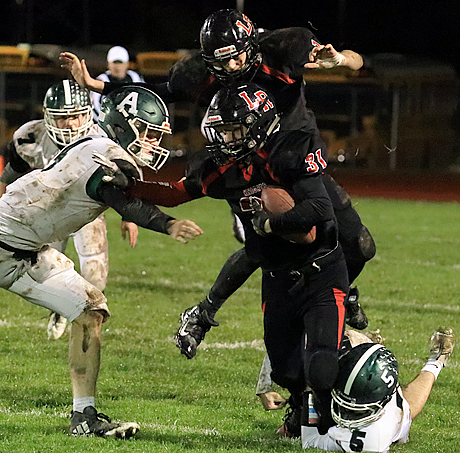
Chase Bordonaro fights for key yardage.

Kyler LaCarte tugs a would-be Avon tackler.

Andrew Englerth splits the Avon defense.

Alex Panepento finds himself surrounded by Avon Braves.
Trojans win first-round playoff game 30-0
The Alexander Trojans shutdown Clyde-Savannah in a first-round game of the Class D Section V playoffs for a 30-0 win.
Running Back Ty Woods opened the scoring with a two-yard TD run in the first quarter. In the second quarter, he scored again as the Trojans began to take control of the game. Late in the second quarter, Dylan Busch connected with receiver Josh DeVries for a score.
Alexander's first score of the second half came on a 30-yard field goal by Eric Cline, which was set up on a third-and-28 screen pass to Devin Dean for a 15-yard gain.
A few plays later, Alexander scored again on a 31-yard run by Woods. Cline missed a point-after-attempt for only the second time this season.
On defense, Ethan Heineman had two sacks and two tackles. Woods had 12 tackles on the night. Nick Kramer notched a sack and 10 tackles. Adding to the team sack total were Dean and Gavin Smith-Crandall with one each. Kam Lyons had an interception to go along with two receptions on offense.
The Trojans will face the winner of today's Red Jacket vs. Geneseo game today in its next playoff game.
Buffalo-based taco truck company apologizes for serving lunch to staff at Buffalo Detention Facility in Batavia
After some users took to social media to criticize Lloyd Taco Truck, a Buffalo-based company, for serving lunch on Tuesday at the Buffalo Detention Facility, which is in Batavia, the company today issued an apology and called the decision to bring a truck to the facility a "lapse in judgment."
The Buffalo Detention Facility is a federal holding facility used primarily to detain people suspected of violating immigration laws or facing possible deportation because of other criminal acts.
As a goodwill gesture to those upset by the business decision, the company said it was donating proceeds from sales to an advocacy coalition called Justice for Migrant Families WNY, which is based in Buffalo.
The decision drew criticism from Sen. Rob Ortt, who doesn't represent Genesee County, but is a candidate for the NY-27 congressional seat.
“In what world does a company feel the need to apologize for serving food to federal law enforcement officers who work in dangerous conditions? Pathetic pandering. The men and women who work to enforce our immigration laws and protect us deserve better.”

Previously: The Batavian tours the Buffalo Detention Facility
Pagination
- First page
- Previous page
- …
- 283
- 284
- 285
- 286
- 287
- …
- Next page
- Last page

